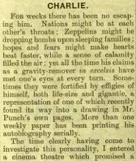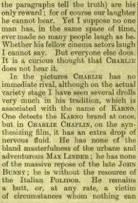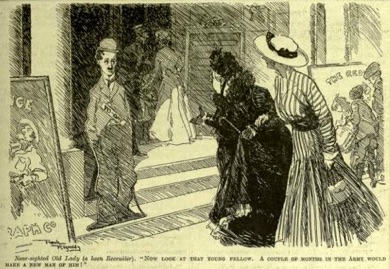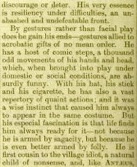A Night In The Show next previous
A Night in the Show Clippings 3/54
Punch, London, September 1, 1915.
Near-sighted Old Lady (a keen Recruiter). „Now look
at that young fellow. A couple of months
in the army would make a new man of him!“
(...) Cartoon, Punch, London, July 28, 1915
„Charlie Chaplin is crossing the equator“
Editorial content. „Charlie.
For weeks there has been no escaping him. Nations might
be at each other‘s throats; Zeppelins might be dropping
bombs upon sleeping families; hopes and fears might make
hearts beat faster, while a sense of calamity filled the air;
yet all the time his claims as a gravity-remover in excelsis have
met one‘s eyes at every turn. Sometimes they were
fortified by effigies of himself, both life-size and gigantic,
a representation of one of which recently found its
way into a drawing in Mr. Punch‘s own pages. More than one
weekly paper has been printing his autobiography
serially.
The time clearly having come to investigate this
personality, I entered a cinema theatre which promised a play
with the famous man at his best. And than I entered
others, for Chaplinism had caught me.
Whether or not Charlie Chaplin is, as is claimed for
him by certain not disinterested people, the ,funniest
man on earth,‘ I leave to others to decide. Two persons rarely
agree on such nice points, and I retire at one from
arbitrament because I don‘t know all the others. But that
he is funny is beyond question. I will swear to that.
His humor is of such elemental variety that he would make
a Tierra del Fuegan or a Bushman of Central Australia
laugh not much less than our sophistical selves. One needs no
civilized culture to appreciate the fun of the harlequinade,
and to that has Charlie, with true instinct, returned. But it is the harlequinade accelerated, intensified, toned up for the
exacting taste of the great and growing ,picture‘ public. It is also
farce at its busiest, most furious. Charlie has brought
back that admirable form of humor which does not disdain the
co-operation of fisticuffs, and in which, by the way of
variety, one man is aimed at and another, too intrusive, is hit.
However long the world may last, it is safe to say that
the spectacle of one man receiving a blow meant for another
will ever be popular. Indeed the delivery of blows at all
will ever be popular. Thus – glory be! – are we built.
What strikes one quickly is the realization of how much
harder Charlie works than any other of the more illustrious filmers.
He is rarely out of the picture, and he gives full measure.
In the course of five minutes he receives and distributes a myriad
black eyes, a myriad falls. He kicks abundantly and is
abundantly kicked. He runs and is pursued. There is no physical indignity that he does not suffer – and inflict. Such
impartiality is rare in drama, where usually men are either
on top or underneath. In the ordinary way our pet
comedians must be on top – as, for example, Mr. George
Graves with his serenely conquering tongue. Even
the clown, though he receives punishment en route, eventually
triumphs. But Charlie Chaplin seldom wins. Circumstances
are too much for him, and he goes out in a very riot of grotesque
misfortune. With him, however, are always our sympathies.
These and a triffle of £500 a week (if the paragraphs tell the truth)
are his only reward; for of course he cannot hear. Yet
I suppose no one man has, in the same space of time, ever
made so many people laugh as he. Whether his fellow
cinema actors laugh I cannot say. But everyone else does.
It is a curious thought that Charlie does not hear it.
In the pictures Charlie has no immediate rival, although
on the actual variety stage I have seen several drolls
very much in his tradition, which is associated with the name
of Karno. One detects the Karno brand at once, but
in Charlie Chaplin, on the synthesizing film, it has an extra drop
of nervous fluid. He has none of the bland masterfulness
of the urbane and adventurous Max Linder; he has none of the
massive repose of the late John Bunny; he is without the
resource of the Italian Polidor. He remains a butt, or, at any
rate, a victim of circumstances whom nothing can
discourage or deter. His very essence is resiliency under
difficulties, an unabashed and undefeatable front.
By gestures rather than facial play does he gain his ends – gestures allied to acrobatic gifts of no mean order. He has
a host of comic steps, a thousand odd movements of his hands
and head, which when brought into play under domestic
or social conditions, are absurdly funny. With his hat, his stick
and his cigarette he has also a vast repertory of quaint
actions; and it was a wise instinct that caused him always to
appear in the same costume. But his especial fascination
is that life finds him always ready for it – not because he is armed
by sagacity, but because he is even better armed by folly.
He is first cousin to the village idiot, a natural child of nonsense,
and, like Antaeus, every time he rises from a knockdown
blow he is the stronger.
The promise of Chaplin is sacred; the promise of John
Bradbury is not more so. Seeing him, one is assured
that he is about to make hay of all the other dramatis personae.
One may sit back safely and prepare for fun. He joins
the film in his unobtrusive methodist way as quietly as a smut
settling on a nose, and behold he is the very spirit of
discord, the drollest of all the lords of misrule. Whereever he goes Charlie Chaplin is crossing the equator.“
Quoted in Evening Public Ledger, Philadelphia,
December 18, 1915.
Redaktioneller Inhalt
A Night In The Show next previous










